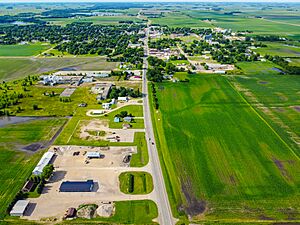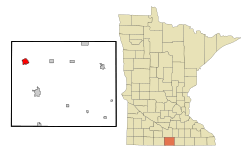Winnebago, Minnesota facts for kids
Quick facts for kids
Winnebago
|
|
|---|---|

US-169 runs through town
|
|
| Motto(s):
Small Town, Big Heart!
|
|

Location of Winnebago, Minnesota
|
|
| Country | United States |
| State | Minnesota |
| County | Faribault |
| Settled | June 1855 |
| Organized | October 1858 |
| Platted | January 1857 |
| Incorporated | February 19, 1857 |
| Area | |
| • Total | 2.36 sq mi (6.11 km2) |
| • Land | 2.35 sq mi (6.08 km2) |
| • Water | 0.01 sq mi (0.03 km2) |
| Elevation | 1,106 ft (337 m) |
| Population
(2020)
|
|
| • Total | 1,391 |
| • Estimate
(2022)
|
1,391 |
| • Density | 592.42/sq mi (228.76/km2) |
| Time zone | UTC−6 (Central (CST)) |
| • Summer (DST) | UTC−5 (CDT) |
| ZIP Code |
56098
|
| Area code(s) | 507 |
| FIPS code | 27-70924 |
| GNIS feature ID | 2397347 |
| Sales tax | 6.875% |
Winnebago is a city located in Faribault County, Minnesota, in the United States. In 2020, about 1,391 people lived there.
Contents
History of Winnebago
Winnebago was first called Winnebago City. It was planned out in 1856. The city got its name from the Winnebago Indians. They had recently moved to a nearby reservation. Before that, they lived further north near Long Prairie.
A post office opened in Winnebago City in 1857. The word "City" was removed from the name in 1905.
The first train service came to Winnebago in 1871. This happened when the Southern Minnesota Railroad finished its line to the town. Winnebago was the end of the line for trains until 1878. Then, the line was made longer to the west. It reached the state border at Airlie in 1880. In the same year, the Southern Minnesota Railroad became part of a bigger company. This company was called the Chicago, Milwaukee, St. Paul and Pacific Railroad. People often called it the Milwaukee Road.
Geography and Climate of Winnebago
Winnebago covers an area of about 2.27 square miles (5.88 square kilometers). All of this area is land.
Two important roads go through the city. They are U.S. Route 169 and Minnesota State Highway 109.
Winnebago is located about nine miles north of Interstate 90. It is also about 28 miles south of Mankato.
Weather in Winnebago
Winnebago has a varied climate. Here is some information about its weather:
| Climate data for Winnebago, Minnesota, 1991–2020 normals, extremes 1898–present | |||||||||||||
|---|---|---|---|---|---|---|---|---|---|---|---|---|---|
| Month | Jan | Feb | Mar | Apr | May | Jun | Jul | Aug | Sep | Oct | Nov | Dec | Year |
| Record high °F (°C) | 63 (17) |
63 (17) |
85 (29) |
95 (35) |
106 (41) |
104 (40) |
107 (42) |
106 (41) |
100 (38) |
92 (33) |
82 (28) |
67 (19) |
107 (42) |
| Mean maximum °F (°C) | 42.8 (6.0) |
47.3 (8.5) |
65.8 (18.8) |
80.8 (27.1) |
89.1 (31.7) |
92.7 (33.7) |
92.2 (33.4) |
90.5 (32.5) |
88.9 (31.6) |
82.6 (28.1) |
65.9 (18.8) |
47.2 (8.4) |
95.1 (35.1) |
| Mean daily maximum °F (°C) | 23.2 (−4.9) |
27.8 (−2.3) |
40.4 (4.7) |
56.1 (13.4) |
68.8 (20.4) |
78.8 (26.0) |
82.2 (27.9) |
79.7 (26.5) |
73.7 (23.2) |
59.9 (15.5) |
42.7 (5.9) |
28.7 (−1.8) |
55.2 (12.9) |
| Daily mean °F (°C) | 14.4 (−9.8) |
19.0 (−7.2) |
31.8 (−0.1) |
45.9 (7.7) |
58.5 (14.7) |
68.9 (20.5) |
72.3 (22.4) |
69.8 (21.0) |
62.6 (17.0) |
48.9 (9.4) |
33.9 (1.1) |
20.7 (−6.3) |
45.6 (7.5) |
| Mean daily minimum °F (°C) | 5.6 (−14.7) |
10.3 (−12.1) |
23.3 (−4.8) |
35.7 (2.1) |
48.2 (9.0) |
59.0 (15.0) |
62.4 (16.9) |
59.9 (15.5) |
51.4 (10.8) |
37.9 (3.3) |
25.0 (−3.9) |
12.6 (−10.8) |
35.9 (2.2) |
| Mean minimum °F (°C) | −16.0 (−26.7) |
−11.1 (−23.9) |
0.0 (−17.8) |
20.5 (−6.4) |
34.1 (1.2) |
47.0 (8.3) |
52.3 (11.3) |
49.7 (9.8) |
35.6 (2.0) |
22.2 (−5.4) |
6.3 (−14.3) |
−9.4 (−23.0) |
−19.2 (−28.4) |
| Record low °F (°C) | −35 (−37) |
−32 (−36) |
−25 (−32) |
0 (−18) |
20 (−7) |
31 (−1) |
44 (7) |
36 (2) |
22 (−6) |
0 (−18) |
−13 (−25) |
−30 (−34) |
−35 (−37) |
| Average precipitation inches (mm) | 0.90 (23) |
1.03 (26) |
1.88 (48) |
3.48 (88) |
4.51 (115) |
5.05 (128) |
4.18 (106) |
3.94 (100) |
3.47 (88) |
2.67 (68) |
1.64 (42) |
1.24 (31) |
33.99 (863) |
| Average snowfall inches (cm) | 10.4 (26) |
9.1 (23) |
7.3 (19) |
4.1 (10) |
0.0 (0.0) |
0.0 (0.0) |
0.0 (0.0) |
0.0 (0.0) |
0.0 (0.0) |
0.4 (1.0) |
5.4 (14) |
10.5 (27) |
47.2 (120) |
| Average precipitation days (≥ 0.01 in) | 7.6 | 6.6 | 8.3 | 10.7 | 12.8 | 12.1 | 9.4 | 9.4 | 8.6 | 8.6 | 6.5 | 8.0 | 108.6 |
| Average snowy days (≥ 0.1 in) | 5.5 | 5.1 | 3.0 | 1.2 | 0.0 | 0.0 | 0.0 | 0.0 | 0.0 | 0.4 | 2.7 | 5.4 | 23.3 |
| Source 1: NOAA | |||||||||||||
| Source 2: National Weather Service | |||||||||||||
People of Winnebago
| Historical population | |||
|---|---|---|---|
| Census | Pop. | %± | |
| 1860 | 48 | — | |
| 1870 | 326 | 579.2% | |
| 1880 | 993 | 204.6% | |
| 1890 | 1,108 | 11.6% | |
| 1900 | 1,816 | 63.9% | |
| 1910 | 1,554 | −14.4% | |
| 1920 | 1,641 | 5.6% | |
| 1930 | 1,701 | 3.7% | |
| 1940 | 1,992 | 17.1% | |
| 1950 | 2,127 | 6.8% | |
| 1960 | 2,088 | −1.8% | |
| 1970 | 1,791 | −14.2% | |
| 1980 | 1,869 | 4.4% | |
| 1990 | 1,565 | −16.3% | |
| 2000 | 1,487 | −5.0% | |
| 2010 | 1,437 | −3.4% | |
| 2020 | 1,391 | −3.2% | |
| 2022 (est.) | 1,391 | −3.2% | |
| U.S. Decennial Census 2020 Census |
|||
Winnebago Population in 2010
In 2010, the city had 1,437 people living there. There were 609 households, which are groups of people living in one home. About 379 of these were families.
Most people in Winnebago were White (95.5%). A small number of people were from other racial backgrounds. About 7.5% of the population was Hispanic or Latino.
About 27.4% of households had children under 18. Nearly half (48.1%) were married couples living together. Some households had a single parent.
The average age of people in Winnebago was 42.3 years old. About 23.3% of residents were under 18. About 22.1% were 65 years old or older. The city had slightly more females (52.0%) than males (48.0%).
Famous People from Winnebago
- Harry Chozen - A player in Major League baseball.
- John E. Grotberg - A U.S. Representative from Illinois.
- Margaret Hurley - A lawmaker in Washington State.
- William Knight - A lawyer and newspaper publisher. He was the father of Phil Knight, who started Nike Inc..
- Allen Walker Read - A person who studied languages and the history of words.
- Harry E. Siman - A State Senator in Nebraska.
See also
 In Spanish: Winnebago (Minnesota) para niños
In Spanish: Winnebago (Minnesota) para niños

